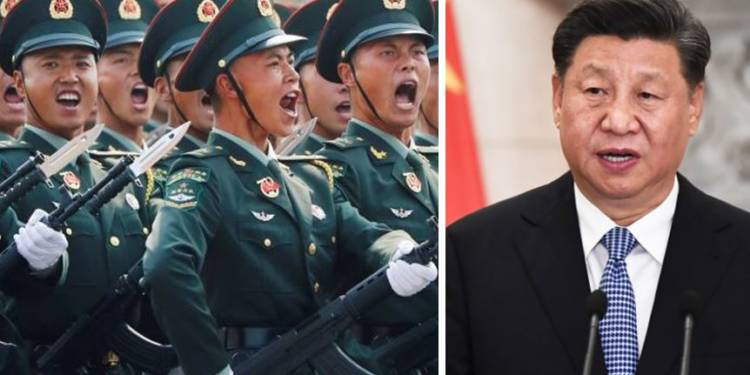Ever since the COVID-19 outbreak gripped the entire world, there has been a palpable rise in Chinese belligerence. The Dragon has been behaving in an unusually aggressive fashion in the South China Sea continuously harassing other stakeholders in the strategic and resource-rich waters, apart from conducting regular military exercises around Taiwan, and threatening the island country of an invasion by the PLA. Similarly, in East China Sea it has been engaged in conflict with Japan over a set of disputed islands, and on its Southern front, it has engaged in face-offs with the Indian Army in Sikkim and Eastern Ladakh.
However, while China is showing unprecedented belligerence even by its own levels, the many Chinese conflicts are unlikely to escalate primarily owing to the zero-combat experience of the People’s Liberation Army and Beijing’s history of sheer reluctance when it comes to fighting wars.
To put it in a better way, China does not know how to fight wars, and historically speaking, it only has a history of embarrassing defeats to hide when it comes to the country’s war experience. In the medieval era, the country was invaded in a ruthless conquest by the Mongols, and by the year 1279, Mongol leader Kublai Khan had established the Yuan dynasty, overthrowing the Song dynasty. This was for the first time that China was ruled by a foreign power.
Even in the last century, China has had a history of getting crushed by the Japanese before, and during the Second World War when Tokyo’s germ assaults on China had caused widespread damage in the country. Till date, Beijing keeps reminding Japan of the of those excesses.
In fact, between 1931 and 1944, when the Allies counterattacked Japan forcing it to surrender, the Japanese forces had run berserk against a helpless China, and cities like Nanjing, Shanghai and Guangzhou had fallen to the Japanese forces. The Chinese Air Force was completely overpowered by Japanese airpower, and Japan had bombed the Chinese forces at will.
The modern People’s Liberation Army does not have much to boast about either. Compare it with say the Indian Army which is a professional Army whose exploits date back to the Saragarhi battle of 1897, tremendous contributions during the First and the Second World Wars, followed by the many wars and battles that it fought with utmost valour post-Independence.
What is even the People’s Liberation Army? A group of rebels that happened to have won the Chinese Civil War, establishing the People’s Republic of China. In the modern era, the PLA doesn’t have much to boast about either. The 1962 Sino-India war too is not something that Beijing can call an achievement.
The war had been provoked by Mao in order to deflect attention from the crippling ffamine within China triggered by the ‘Smash Sparrow’ campaign, and which killed millions. New Delhi was caught unawares with an indecisive political leadership in the then PM Jawaharlal Nehru, yet China couldn’t manage a rout and suffered heavy casualties itself as the Indian Army fought to the last man despite getting outnumbered and outgunned.
Five years later, India gave China a bloody nose during the Nathu La battle and while the Indian Army lost 88 soldiers, disproportionate casualties were inflicted on the Chinese- over 400 by their own estimate. The 1967 battle sealed Sikkim’s accession to India eight years later.
This is why PLA is unlikely to engage the Indian Army, as the latter also happens to have good combat experience- having fought four fierce wars since 1947, including the recent, high-altitude Kargil war apart from handling terrorism in Kashmir Valley and militant outfits in the Northeast that has kept the Indian Army combat-ready.
China wants to erase these embarrassments from its forgetful military history, and what it also wants to erase is the 1979 Vietnam war when a seasoned Vietnamese military thwarted China’s attempted invasion.
Today, the People’s Liberation Army is in an even worse condition- the handful of combat veterans who already do not have an encouraging war history to boast about, are going to retire within the next few years.
In such circumstances, one cannot expect the PLA to pick up a major armed conflict in theatres that are prone to flare-ups and rising tensions. In Taiwan itself, the area which is itself seen as a potential flashpoint in the region, Beijing is not likely to invade despite constant threats from angry military generals and CCP officials.
It is widely accepted that the invasion of Taiwan is a bloody, logistical nightmare- one that the People’s Liberation Army is too inexperienced to handle. Taiwan has been preparing for a military conflict for the past 70 years, and that too with a single-minded focus on China. It is not easy to overwhelm Taiwan militarily especially when one brings the United States into the equation.
Secondly, China faces geographically adverse conditions as it will have to transport hundreds of soldiers through the narrow Taiwan Strait into hostile landing beaches. From there, it will have to find its way through dense mountains to reach Taipei. Despite its aggressive stance on Taiwan, Beijing has held itself back from invading Taiwan for seven decades because it understands the practical challenges involved, the political fallouts of such an invasion, and the heavy bloodshed that the PLA cannot afford.
For China, disputes, whether on land or in Sea, are not flashpoints for further escalation, rather they are bargaining chips which Beijing uses to enjoy an upper hand at the diplomatic table. China neither has the stomach, nor the willingness to fight. All it can do is issue threats or provoke other parties by engaging in scuffles with Indian Army troops or chasing fishing boats in disputed waters.

























